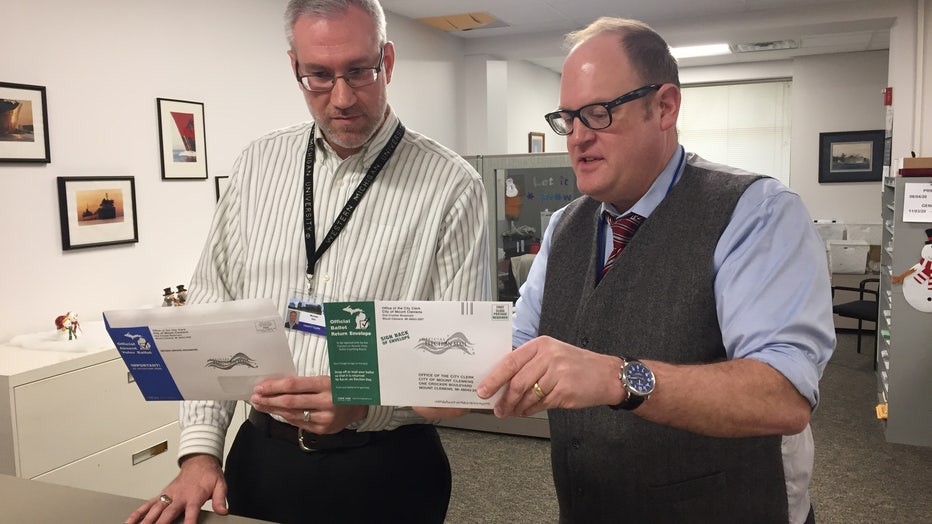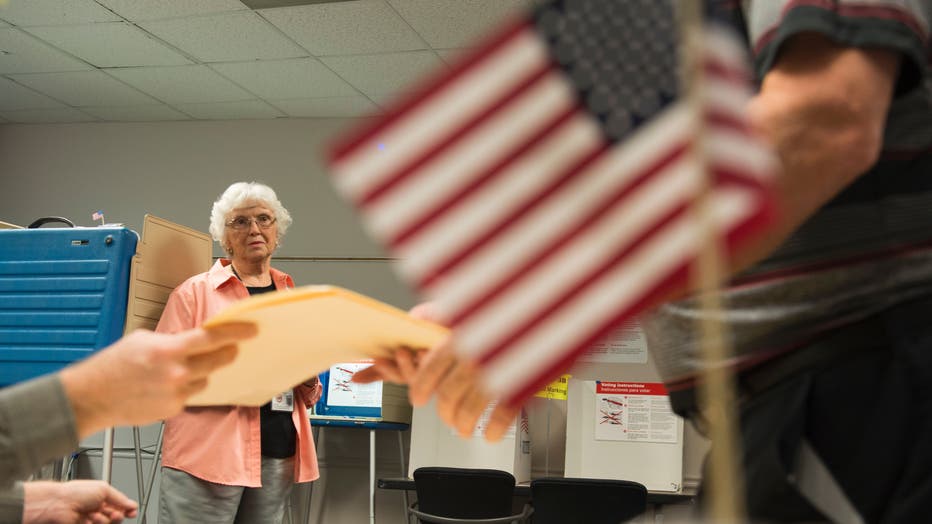“We will fail,” Clerks worry absentee ballot count will delay Michigan election results
LANSING, Mich. - Political analysts are predicting a historically high count of absentee ballots during the Michigan primary election March 10.
Sonja Buffa, clerk for the city of Warren has another prediction.
“We will fail.”
County and city clerks around Michigan are increasingly concerned that the record-breaking number of people casting their ballots as absentees will delay the timing when they can report election results. Despite a law change that now allows any residents to vote absentee, clerks haven’t been given any more time to count those ballots.
In a tense presidential race that’s already featured at least one statewide election riddled with errors, the pressure is on for precincts to tabulate and report their votes in a timely fashion. But Buffa isn’t even sure her workers will have votes ready to be reported before the sun rises the next morning.
“We’re preparing for the unknown. We’re getting ready for more ballots and hiring more workers, but the process is still the same,” she said.
And that process starts at five in the morning when workers begin fielding calls from precincts in each county. It will be business as usual for any workers manning the booths for voters casting their ballot on election day. But for workers counting absentee ballots, once they start their shift, they can’t leave until everyone is counted.
“If someone is starting at 8 (in the morning), then more at 2, nobody can leave,” Buffa said. “It could be 4 in the morning before all votes are counted.”
Even under normal circumstances, voting days are long. But after voters approved Prop 3 in 2018, which allowed Michigan residents to cast an absentee ballot without providing a reason, the number of ballots being mailed in is up more than 78 percent across the state, compared to the 2016 election. On March 2, the absentee ballot count exceeded 800,000.
Absentee ballot increase may delay Michigan election results
Michigan clerks are worried a surge in absentee ballots will delay results on Election Day. The number of requested early ballots is up 70% since 2016. However, Senate Majority Leader Mike Shirkey, R-Clark Lake, says he's in opposition to legislation that would allow clerks to start opening return envelopes early. But if no action is taken, will lawmakers be setting clerks up to fail on election day?
During the 2018 gubernatorial election, Clinton Township had voting numbers ready by 11:30 p.m., but a technical glitch kept them from reporting until 1 in the morning. Now, with Macomb County (where Clinton Township is located) anticipating a potential 35 percent increase in absentee ballots, the time when election information will be ready for reporting may come even later.
“You just want to stress it’s not speed, it’s accuracy,” said Kim Meltzer, Clinton Township clerk. “Every vote has to count. Sometimes they come in (stained) with olive oil or corn that we may need to spend more time on. You just don’t know what the day’s going to look like.”
There’s aren't many reference points for election officials to anchor their 2020 voting predictions on. The new absentee ballot law means the rules have changed for voters casting ballots.
But not for the officials like Meltzer and Buffa who count them.
"(Prop 3) brought about the biggest changes in elections in Michigan in a generation, but as of yet we have not seen an allocation of resources to implement these changes," said Macomb County Clerk Fred Miller. "Local clerks are dedicated to meeting the challenges but are in desperate need of resources for and from municipalities to provide adequate staffing, training, postage, and printing, among other things."
The entire voting process incorporates several sets of eyes for oversight to ensure accuracy, as well as safeguards to prevent against voting irregularities. Even after every precinct goes through its steps, the results are mailed to the county clerk office for a second level of oversight. After they’re certified, they’re sent to Lansing.

Macomb County Clerk Fred Miller eyes an absentee ballot (Macomb County Clerk's office)
The uncertainty of Election Day, coupled with the long hours and sequestration for those counting absentee ballots can be hard on the precinct station workers, whose average age is 70 years old. But for Miller, the inefficiency is necessary.
“I think the more you learn about elections in Michigan and how every state is different, the more you realize there are many steps in the process,” he said. “It is inefficient, but in that are built-in double-checks to avoid high jinks. There are so many pairs of eyeballs in each step of the process, there’s counterbalancing that makes for a secure process.”
Several solutions have been proposed at the state level to improve some of those inefficiencies. HB 5447 and 5448 would allocate $3 million to local governments to purchase high-speed tabulators to offset the increase in absentee voting. HB 5449 and 5450 would allocate $1.5 million for additional pay to hire new election workers.

An election official watches as a man takes a ballot at an in-person absentee voting station in Fairfax, Virginia on October 12, 2016. / AFP / Andrew CABALLERO-REYNOLDS (Photo credit should read ANDREW CABALLERO-REYNOLDS/AFP via Getty Images)
Sen. Ruth Johnson (R-Holly), Michigan’s former Secretary of State has also introduced legislation that would give clerks more time to count absentee ballots. The bill proposes letting election officials removing absentee ballots from their mailing envelopes, but not from their secrecy sleeve.
Meltzer said just that step alone would shave off about three hours of the absentee vote count time.
“It’s a long day to be there from 6 a.m. until polls closed. That’s a long day,” she said. “The legislature has to give us more time to open ballots.”
On FOX 2’s Let It Rip, Michigan Secretary of State Jocelyn Benson said Michigan’s election laws are “antiquated and haven’t been updated.” In states that have modified their election systems like in Ohio, their clerks and administrators are allowed to process ballots prior to election day.
“It’s not rocket science. It’s actually good for integrity and election security and it’s good to ensure our clerks when they are counting those ballots on election day that they are fresh and ready to go,” she said, “and they’re not spending hours and hours processing, which they could have done beforehand.”
However, Senate Majority Leader Mike Shirkey (R-Clarklake) opposes that legislation, saying it would set a “dangerous precedent.”
“I don’t necessarily think we should be trying to solve a problem before it actually occurs,” he told reporters in February. "If I had to choose between early voting, early counting, versus late reporting, I’ll take late reporting all day long."
The rest of the country may not be interested in late reporting, however. The 2020 Democratic nomination race kicked off its first statewide race in Iowa with late reporting. It was met with widespread disapproval and mockery from candidates and pundits.
Michigan represents a key battleground state in both the Democratic nomination, as well as the general election. Rated as a toss-up state for the presidential race, candidates have already left a sizable footprint in advertising spending and campaign rallying in Michigan. Whatever direction the state’s delegates swing will have large implications across the country.
RELATED: Ignoring early voting states, Mike Bloomberg has eyes on Michigan
Johnson’s legislation was unlikely to be approved by Michigan’s Primary Election Day. But Shirkey’s opposition to the bill shoots down the likelihood of relief coming to clerks by the November general election.
What isn’t quite clear is if the rise in absentee ballots will be offset by a decline in election-day turnout. For Macomb County, which has seen more than a 73 percent increase in absentee ballot requests from 2016, they’ll likely be processing more than 100,000 votes.
“That’s a significant uptick. What remains to be seen is if the people taking advantage of this would already be coming in and voting, or are these new voters? Is this indicative of higher interest?” Miller said. “My senses tell me it’s a combination of both.”
For any residents who have already casted their absentee vote for a candidate that has dropped out of the race, including former South Bend Mayor Pete Buttigieg or Minnesota Sen. Amy Klobuchar. Voters should contact their local clerk or go to the secretary of state website for more information.
Jack Nissen is a reporter at FOX 2 Detroit. You can contact him at (248) 552-5269 or at Jack.Nissen@Foxtv.com

